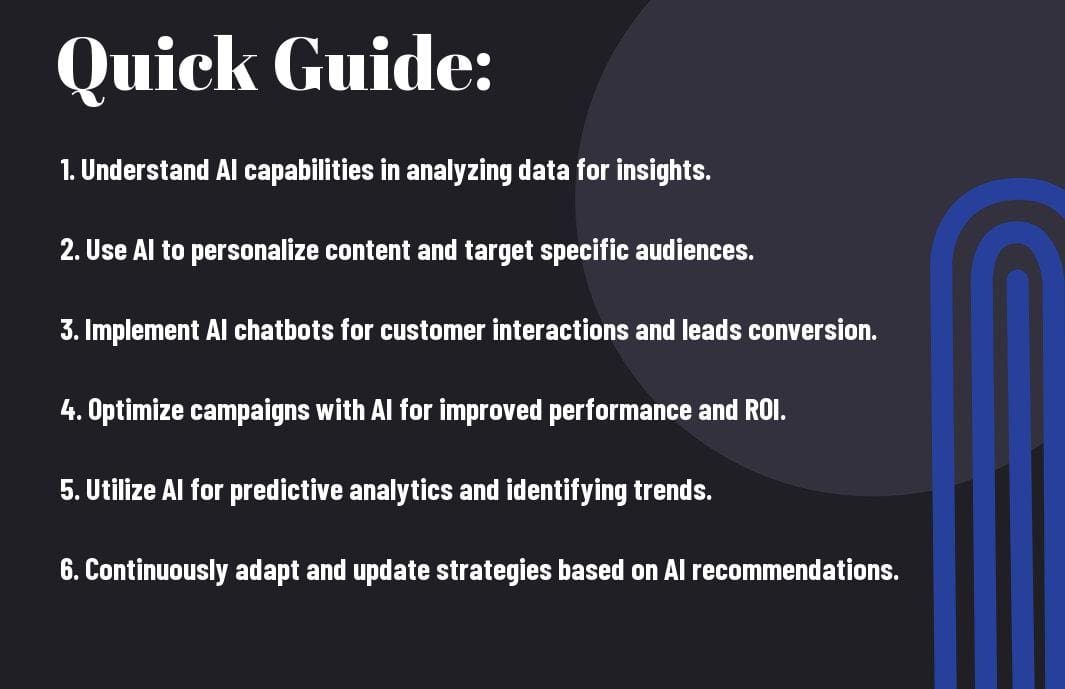Marketing in the digital age has evolved dramatically, with Artificial Intelligence (AI) at the forefront of innovation. Leveraging AI in digital marketing strategies is no longer a luxury but a necessity for businesses looking to stay competitive in the ever-growing online landscape. From personalized customer experiences to predictive analytics, AI has the power to revolutionize how companies attract, engage, and retain customers. However, with great power comes great responsibility, as understanding and implementing AI effectively can be daunting for many marketers. In this comprehensive guide, we will explore the benefits, challenges, and best practices of integrating AI into your digital marketing strategies, empowering you to harness the full potential of this game-changing technology.
Key Takeaways:
- Personalization is key: Utilizing AI in digital marketing allows businesses to create highly personalized experiences for customers, improving engagement and conversion rates.
- Data-driven decision making: AI can analyze vast amounts of data quickly and effectively, helping marketers make informed decisions based on actionable insights.
- Automation for efficiency: AI-powered tools can automate routine tasks such as email campaigns, social media scheduling, and customer service, freeing up time for marketers to focus on strategy and creativity.


Understanding AI in Digital Marketing
The use of Artificial Intelligence (AI) in digital marketing has revolutionized the way businesses interact with their customers. AI technologies have the potential to transform marketing strategies by providing valuable insights and automating various processes.
Types of AI Technologies Leveraged in Marketing
- Machine Learning: Algorithms that learn from data to make predictions and decisions.
- Natural Language Processing (NLP): Technology that enables machines to understand, interpret, and generate human language.
- Computer Vision: AI capability that allows machines to interpret and understand the visual world.
- Chatbots: AI-powered assistants that can engage with customers in real-time.
- Predictive Analytics: Using data, statistical algorithms, and machine learning techniques to identify the likelihood of future outcomes.
This breakdown shows the variety of AI technologies leveraged in marketing to enhance customer experiences and drive business growth.
Key Factors Influencing AI Integration in Digital Strategies
- Data Quality: Ensuring that data used by AI systems is accurate and reliable.
- Infrastructure: Having the necessary resources and technology in place to support AI integration.
- Regulatory Compliance: Adhering to data privacy laws and regulations when utilizing AI technologies.
- Skills and Training: Equipping teams with the knowledge and capabilities to leverage AI effectively.
- Business Objectives: Aligning AI initiatives with overall business goals and objectives.
Even with the advancements in AI technology, businesses must consider these key factors to successfully integrate AI into their digital marketing strategies. Any oversight in these areas can lead to ineffective implementation and missed opportunities for growth.
Planning and Implementing AI in Your Marketing Efforts
Step-by-Step Guide to Integrating AI into Digital Marketing
While planning to integrate AI into your digital marketing efforts, it is crucial to follow a structured approach. Below is a step-by-step guide on how to incorporate AI into your marketing strategy:
| Step 1 | Identify the goals and objectives you want to achieve with AI in marketing. |
| Step 2 | Assess the data you have and the data you need for effective AI implementation. |
| Step 3 | Choose the right AI tools or platforms that align with your marketing needs. |
| Step 4 | Implement AI technologies gradually and test them for optimal performance. |
Tips for Effective AI Deployment in Marketing Campaigns
Implementing AI in marketing campaigns can revolutionize your strategies. To ensure successful deployment, consider the following tips:
- Data Quality: Ensure data accuracy and relevance for AI algorithms.
- Continuous Learning: Allow AI systems to learn and adapt to changing market trends.
- Human Oversight: Maintain human supervision to prevent AI errors or biases.
After mastering these tips, you can enhance the performance and efficiency of your marketing strategies with AI.
Navigating the Digital Marketing Landscape with AI
Pros and Cons of AI in Digital Marketing
| Pros | Cons |
| Increased Efficiency | Potential Lack of Personalization |
| Enhanced Data Analysis | Initial Implementation Cost |
| Improved Targeting | Privacy Concerns |
| 24/7 Availability | Dependency on Technology |
Now, while AI brings various benefits to digital marketing, it also comes with its own set of challenges and considerations. Understanding the pros and cons is crucial for successfully leveraging AI in your marketing strategies.
Best Practices for Balancing AI and Human Creativity
Digital marketers must strike a delicate balance between utilizing AI technologies for data-driven insights and preserving human creativity to maintain a personalized touch in campaigns. With the right approach, businesses can achieve a harmonious blend of AI efficiency and human ingenuity.
With the implementation of AI in digital marketing, it is important for marketers to stay vigilant and not overlook the importance of authentic human creativity. By combining the precision of AI algorithms with the emotional intelligence of human marketers, companies can create impactful campaigns that resonate with their target audience on a deeper level. Building a cohesive strategy that integrates AI and human creativity seamlessly can result in more engaging and effective marketing initiatives.
The Ultimate Guide To Leveraging Artificial Intelligence In Digital Marketing Strategies
Evaluating AI-Driven Campaigns and Metrics
Measuring the impact of AI on marketing results is crucial to determine the effectiveness of your campaigns. With AI, marketers can track, monitor, and analyze a vast amount of data in real-time to understand consumer behavior better. By evaluating AI-driven campaigns and metrics, businesses can optimize their strategies for improved performance and increased ROI.
Tools and Techniques for Analyzing AI Marketing Success
Tools and techniques play a significant role in analyzing the success of AI marketing strategies. Advanced analytics tools, machine learning algorithms, and predictive modeling help marketers make data-driven decisions to enhance their campaigns. By leveraging these tools, businesses can gain valuable insights into their target audience, optimize their content, and improve overall marketing performance.
When evaluating AI-driven marketing campaigns, it’s important to focus on key performance indicators (KPIs) that align with your business goals. These could include metrics such as conversion rates, customer engagement, ROI, and cost per acquisition. By using the right tools and techniques, businesses can unlock the full potential of AI in their marketing strategies and achieve sustainable growth.
To wrap up
From above, it is evident that leveraging artificial intelligence in digital marketing strategies is a game-changer for businesses of all sizes. By adopting AI technology, companies can enhance customer experiences, personalize marketing efforts, optimize campaigns, and improve overall efficiency. As AI continues to evolve and improve, it is crucial for marketers to stay informed and adapt their strategies accordingly to stay ahead of the competition. Embracing AI in digital marketing is not just a trend but a necessity for businesses looking to thrive in the digital age.
FAQ
Q: What is artificial intelligence in digital marketing?
A: Artificial intelligence in digital marketing refers to the use of AI technologies such as machine learning, natural language processing, and data analytics to automate, optimize, and personalize marketing strategies and campaigns.
Q: How can artificial intelligence improve digital marketing strategies?
A: AI can improve digital marketing strategies by analyzing large amounts of data to identify trends and patterns, creating personalized customer experiences, optimizing ad campaigns in real-time, and predicting future consumer behavior.
Q: What are some examples of using artificial intelligence in digital marketing?
A: Some examples of leveraging AI in digital marketing include chatbots for customer service, predictive analytics for forecasting customer behavior, content recommendations based on user preferences, and automated email marketing campaigns tailored to individual customer segments.




